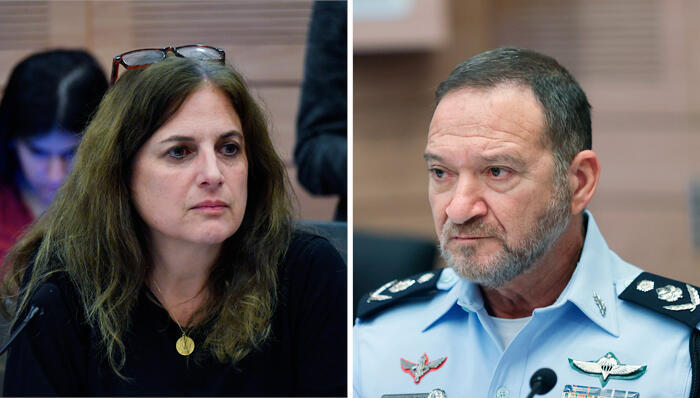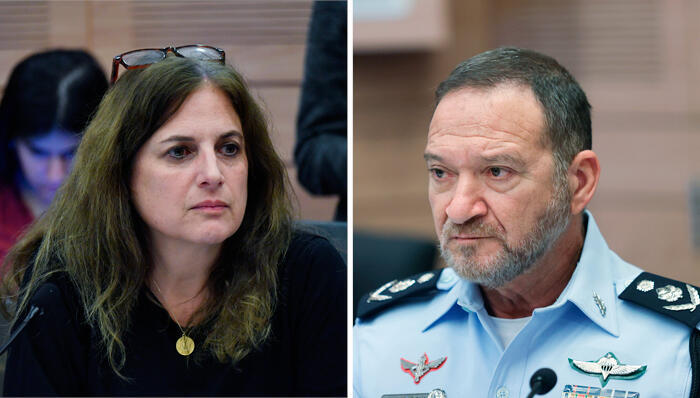
Israel Police purchased new surveillance software without AG approval
After shutting down NSO's Pegasus, the police recently purchased software from Israeli cyber company Rayzone that can track the location and movement of cellphone users without their knowledge
A year-and-a-half after the shutdown of NSO's Pegasus, Israel Police recently purchased new surveillance software from the Israeli cyber intelligence company Rayzone. The software makes it possible, among other things, to locate a person's location and path of movement with an accuracy of one meter and makes it possible to receive additional information from the applications on the target's device. The purchased tool, known as Echo, has to date been sold by Rayzone to intelligence organizations around the world and its use raises questions regarding law, privacy and technology.
The purchase of the new technological tool for the technological intelligence division of the police (Cyber-Signet) and its potential use were not examined or approved by the attorney general’s office, a response provided by the Ministry of Justice has revealed.
The police's decision to purchase the tool without the prior approval of the attorney general’s office is contrary to the conclusions and recommendations of the team established under the chairmanship of Deputy Attorney General Amit Merari, regarding the adoption of surveillance and espionage technologies by the police. This is after the team examined the findings of the Calcalist investigation last year, and determined that the police made illegal, uncontrolled, unsupervised and unauthorized use since 2015 of spyware such as NSO's Pegasus (also known by the police nickname "Saifan").
"Noting the need to carefully examine the compatibility of technological tools with the powers of the police, in view of the extent of the violation of fundamental rights, the police must make sure that before purchasing or independently developing a technological system with a new capability in terms of collecting or processing information, and that has the potential to deviate from the authority established by law, certainly before using it, it will require approval from the attorney general’s office," the conclusions of the Merari team from August of last year read. "This while detailing all the characteristics of the system and the conditions for its operation, along with a legal position regarding the source of the authority."
Locating a person by signs they left on the mobile
The technological capabilities of Rayzone’s Echo surveillance tool were revealed in a Calcalist investigation in December 2020 regarding the cyber intelligence company and the tools it sells to its customers in Asia, South America and Europe.
According to Rayzone’s reports to the Israel Tax Authority, its sales in 2019 were approximately NIS 107 million (approximately $29 million). Out of this amount, the turnover of the Echo company, under which the activity of the geolocating tool Echo was conducted at the time, was only 6.4 million shekels ($1.72 million). The extent of Rayzone's financial engagement with the police, such as the length of the contract, is unknown but is estimated at millions of shekels per year.
Rayzone’s Echo, whose offices are located in the Toyota Towers in Tel Aviv, is a tool that the company markets under the title "Platform for Location Investigations". Rayzone, headed by CEO Eran Reshef and chairman Yohai Bar-Zakai Hasidov, former deputy commander of 8200, writes on its website about tools of this type that they allow "the collection of geospatial intelligence data for better understanding, to discover the unknown, and visually describe individual trends based on specific geographic locations."
In simple words, it is a tool for locating a person, or a group of people, on a geographical basis. The Echo software developed by the company takes advantage of the fact that when a person uses the internet on the mobile phone, they leave behind location marks. Rayzone knows how to reach this information, and the Echo software it developed knows how to connect the landmarks to identify the location of the target in space or the trajectory of their movement.
Complex questions regarding police purchasing
The questions raised by Rayzone’s data collection method as well as the use of the tool by the police are complex. First, the use of the tool allows the police in principle to bypass the supervision and control mechanisms that exist in the law regarding tracking a citizen in real time and retrospectively.
It is not clear, for example, whether and how the court will monitor that the use of the tool does not exceed the powers of the police, that it is used only when there is reasonable suspicion, and that it does not disproportionately infringe fundamental rights, such as privacy, dignity and due process.
Today, the police can receive a person's location data from the cellphone companies by virtue of the Communications Data Law. The companies are obliged by law to keep such data for each of their users. According to the law, in order for the cellphone company to provide the police with such data about its user, the police must first go to court, present the alleged suspicions or evidence against a person, in order to convince the judge to sign an order to receive the data from the cell company. Later, it turns to the cellular operator with the order and receives the information for its intelligence work or investigations.
At this stage it is not known whether the police have drafted a special order with which they will go to court and ask to use the tool against a citizen. It is also unclear and unknown whether the police even presented the possibility to judges and asked for permission to use it. This is just one question that arises from using Rayzone’s tool. There are those who claim that this is information from visible sources, since the user has given his consent to the use of his location data in the application. However, when the information is passed to the enforcement authorities through a third party and not directly, the question arises whether the consent to transfer information to the advertisers also constitutes a confirmation with the knowledge and understanding that this information may later come into the hands of the enforcement authorities who will use it for intelligence gathering or investigations? This is, for example, given that a person has the right to avoid self-incrimination.
In addition, this is a change that also requires regulatory consideration. The information collected by the cellular companies is currently monitored by government regulation, through the Ministry of Communications. But this is not the case when it comes to information collected by a private company, it is not clear how it keeps the information.
Related articles:
Who decided on the purchase of Rayzone’s tool?
Calcalist sent a series of questions on the subject to the Ministry of Justice, the police, and officers in the Cyber-Signet Division headed by Eli Gazit. The Ministry of Justice was asked, in light of the conclusions and recommendations in the Merari report, whether the attorney general’s office knew and approved in advance the purchase of the new surveillance tool from Rayzone? How suitable is the tool to the powers of the police? Who wrote the opinion that approved the use of the tool, and what is the legal source for its use? Have special orders been written and defined that will be brought to a judge for approval in order to use the tool? Have judges been briefed on the tool and its capabilities?
The Ministry of Justice said in response: "After an examination, the matter has not reached us."
Similar questions, as well as the question of who in the police decided to purchase Rayzone’s tool and use it without prior approval from the attorney general’s, were sent to the police as early as May 18. Up until the moment the article was published, and despite repeated requests, the police ignored requests for a response, and did not even answer whether they intended to respond with “No comment”.
In addition to a direct approach to the spokespersons division, including questions regarding the involvement and knowledge of the head of the investigation and intelligence division in the police, Superintendent Yigal Ben Shalom, Calcalist also personally contacted the police spokesperson Eli Levy as well as the head of the spokespersons division in the police Shlomi Sagi, and did not receive a response to the questions. In order to make sure that the questions reached the relevant officials in the police, a personal approach was also made to police officers in the cyber-signet division. Some of them referred us back to the spokesperson, who, as mentioned, did not reply.
The chairman of the Rayzone Group and its controlling owner, Yohai Bar Zakay Hasidoff, said in response to questions about the contract signed with the police that "unfortunately, I cannot refer to the identity of customers."
